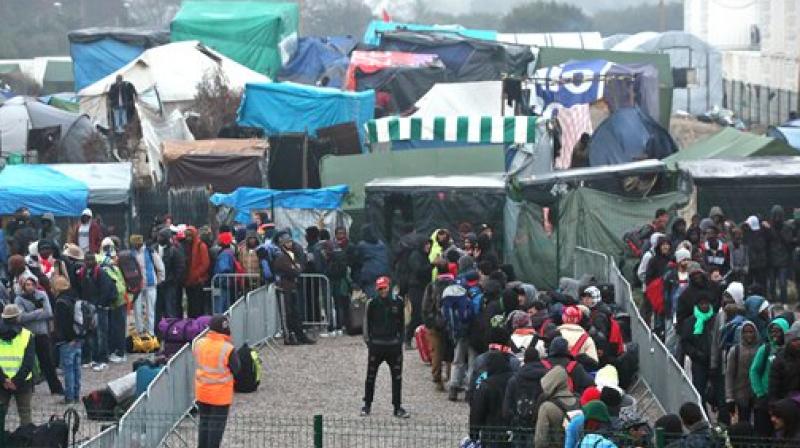Migrants leave Calais 'Jungle' by bus ahead of demolition

Calais, France: Migrants lugging meagre belongings boarded buses Monday taking them away from Calais' "Jungle" under a French plan to raze the notorious camp and symbol of Europe's refugee crisis.
"Bye bye, Jungle!" a group of migrants shouted as they hauled luggage through the muddy lanes of the shantytown where thousands from Africa and the Middle East had holed up, desperate to sneak into Britain.
Scores of Sudanese and Eritrean men queued in the pre-dawn cold outside a hangar where they were later sorted into groups and put on coaches for shelters across France.
By 8:00 am, the line had grown to several hundred people. The first coachload carrying 50 Sudanese left at about 8:45 am (0645 GMT), heading for the Burgundy region of east-central France.
The clearance operation is expected to last three days after which the squalid makeshift town -- one of the biggest in Europe where 6,000-8,000 people have been living in tents and shacks -- will be demolished.
Officials said they hoped to relocate 2,000-2,500 people on the first day.
"I feel very happy, I've had enough of the Jungle," said 25-year-old Abbas from Sudan, who was bundled up in a woolly hat and coat against the cold.
Interior ministry spokesman Pierre-Henry Brandet said the sustained flow of migrants showing up voluntarily to the buses was a "very encouraging sign."
"It shows that the work of persuading them and supporting them has paid off," he told reporters, adding though it was "far too soon" to make an assessment.
Christian Salome, head of the Auberge des Migrants (Migrants' Hostel), one of the Jungle's leading charities, said those who departed on Monday had been impatient to leave.
"I'm much more concerned about later in the week when the only ones remaining are those who do not want to leave, who still want to reach England," he said, estimating their number at around 2,000.
Around 1,200 police officers are being deployed to prevent any unrest.
Riots erupted when French authorities razed the southern half of the settlement in March.
On Sunday night, police fired tear gas during sporadic skirmishes with migrants around the camp.
Clinging to dreams of Britain
Located on wasteland next to the port of Calais, the four-square-kilometre (1.5-square-mile) settlement has become a symbol of Europe's failure to resolve the worst migration crisis in its post-war history, and strained Franco-British ties.
More than one million people fleeing war and poverty in the Middle East, Asia and Africa flooded into the continent last year, sowing divisions across the 28-nation bloc and fuelling the rise of far-right parties, including France's own National Front.
The closure of the Jungle is aimed at ending months of tensions in the Calais area, where clashes between police and migrants trying to climb onto trucks heading to Britain are a near nightly occurrence.
Hours before the evacuation got under way some migrants were however still clinging to hopes of a new life across the Channel, believing their chances of finding a job and integrating there to be better.
"They'll have to force us to leave. We want to go to Britain," said Karhazi, a young Afghan.
A Syrian man named Sam who spent 13 months in the Jungle told AFP he had fled the camp at the weekend to another site about 12 km (seven miles) away where he said "dozens" of migrants were hiding out to avoid being moved.
French authorities have said those who agree to be relocated can apply for asylum in France.
Children stay behind
The migrants are being divided into four groups for families, single men, unaccompanied minors and other people considered vulnerable before taking one of 60 buses waiting Monday to take them to 451 shelters nationwide.
British officials have been racing to process child refugees seeking refuge across the water.
By Saturday, the number of minors given a one-way ticket to Britain under a fast-track process for children that began 10 days ago stood at 194, according to a French charity helping in the process.
Most have relatives across the Channel but Britain has also begun taking children without family links in the country.
Hundreds more have been interviewed and many are still waiting for a reply. They will be provisionally housed with other unaccompanied minors in containers in a part of the Jungle where families had been living.
Adults with relatives in Britain have complained about being left out in the cold. Some have vowed to keep trying to stow away on a truck heading to England by ferry or to jump onto a train entering the Channel Tunnel. Dozens of migrants have died in such attempts.
The centre-right front-runner in next year's French presidential election, Alain Juppe, has called for Britain's border with France, which was extended to Calais under a 2003 accord, to be moved back to British soil.

